Tragedy swept through the Haskell Indian Nations University (HINU) community on May 9th as individuals woke up to news that a tipi erected to honor HINU spring 2020 graduates burned down earlier that morning. HINU security had contacted the Douglas County Emergency Communications Center at 4:35 am and the Lawrence-Douglas County Fire Medical team arrived within 7 minutes to extinguish the flames, leaving only a pile of tipi poles.
Many in the HINU community suspected vandalism and showed concerns that it may have been racially motivated. The burning of Native homes has been a device of colonization and is found in many massacres of Native people like the Sand Creek massacre. Tipi burning is a reminder of this painful past. “I’m really devastated by what appears to be a hate crime on Haskell’s campus” said Renee Kuhl on the Indian Leader’s breaking Facebook post.
The remains of HINU’s tipi were handled accordingly and burned as a ceremonial practice by Ernest Wilson, Acting Supervisor: College Resident Assistant. The Haskell Foundation created a fundraiser to replace the tipi estimated at around $3,000 and surpassed this goal by $12,780 before it was shut down. Additional funds will be cleared by donors to go towards other efforts headed by the Haskell Foundation or returned if requested.
Lawrence-Douglas County Fire Medical released a statement on May 11 announcing that it partnered with HINU, the Federal Bureau of Investigation, and the Federal Bureau of Alcohol, Tobacco, Firearms and Explosives to investigate the fire. The investigation led to the arrest of Ryan Sekayouma Simpson on May 14th. Simpson is Native and a previous HINU student.
Simpson is awaiting trial but his cousin John Horsechief says “I understand one day soon, my cousin will have to answer for this…” and elaborates that Simpson is part of a greater tragedy in Indian Country — substance abuse, alcoholism, and homelessness which Horsechief says, “Unfortunately, this has been a burden among our people for many years.
Horsechief recalls his sober cousin who “… took pride in his Native heritage and that he loved his Native peoples”. COVID-19 pandemic responses created a barrier for Simpson, who was currently homeless and struggling with substance abuse, to get help. Horsechief said the fire was out of character for Simpson and how he was raised. Horsechief believes that “… this should raise concerns for our tribes, Native people and its leaders about the underlying problems that substance abuse and alcoholism create… I cannot imagine how difficult it is to be homeless in Lawrence with this sickness going around.”

